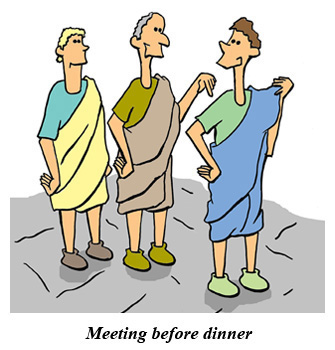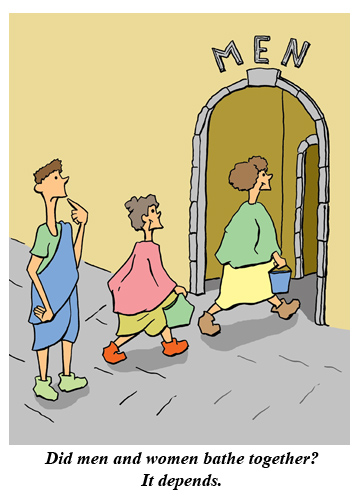|
|
|
|
The Roman Baths
A Most Merry and Illustrated History of a Most Merry and (At Times) Illustrated Pastime
Copyright 2009 Charles F. Cooper
In the early 1960's, Boy's Life magazine printed an article about taking a bath in ancient Rome. It was a typical you-think-you-got-it-bad-now-kids-just-look-what-it-used-to-be-like article. So you grumble because you spend a few minutes in the tub? Huh! Look at the Romans. They had to spend hours taking a bath.

The article went through a lot of detail of the onerous task of Roman bathing. There was no soap, you scrubbed down with a stone (which isn't really correct), and you cleaned yourself by dipping yourself in a sequence of successively heated pools. Finally after hours of this grueling onerous task, you put on your toga and went home. Yep, kids of today really have it easy.
Well, the young readers may or may not have given a wistful sigh of appreciation about the modern conveniences now in the home. At the same time the article left out a few minor details. For once thing you did not go to the baths of Rome just to take a bath. By the time of the mid-empire - say the reign of Trajan - the bathing was secondary to the purpose of the visit. A trip to the bath was to get out of the house and enjoy yourself. You would visit with friends, exercise, play games. You could shop or go to the theater (the Roman equivalent of the movies). Nerds were also welcome. There were libraries where you could sit and read a book or lecture halls to hear some famous philosopher or politician would talk. You could have a snack or a drink. At the baths, the point was to have a good time.

Oh, yes. Perhaps because the author was writing a wholesome educational story for pre-teen and adolescent All-American boys, he didn't mention that when we say that you could have a good time, we mean a good time. A really good time. But more on that later.
A Bath a Day
Given the fact that a daily bath was not a common until the latter half of the twentieth century (especially for lower income families) how is it possible that it became the custom from early days of Rome until the barbarians cut off the water supply? Not only a custom, but one of the most sought after leisures of the Romans and practically considered a right by everyone regardless of economic or social status?

References
Bathing in Public in the Roman WorldGarrett Fagan, University of Michigan Press (1999). The most modern study of Roman bathing. Professor Fagan points out that the contradictions in the epigrammatical, archeological, and literary evidence is best explained by realizing that there were no uniform rules for any given time or place.